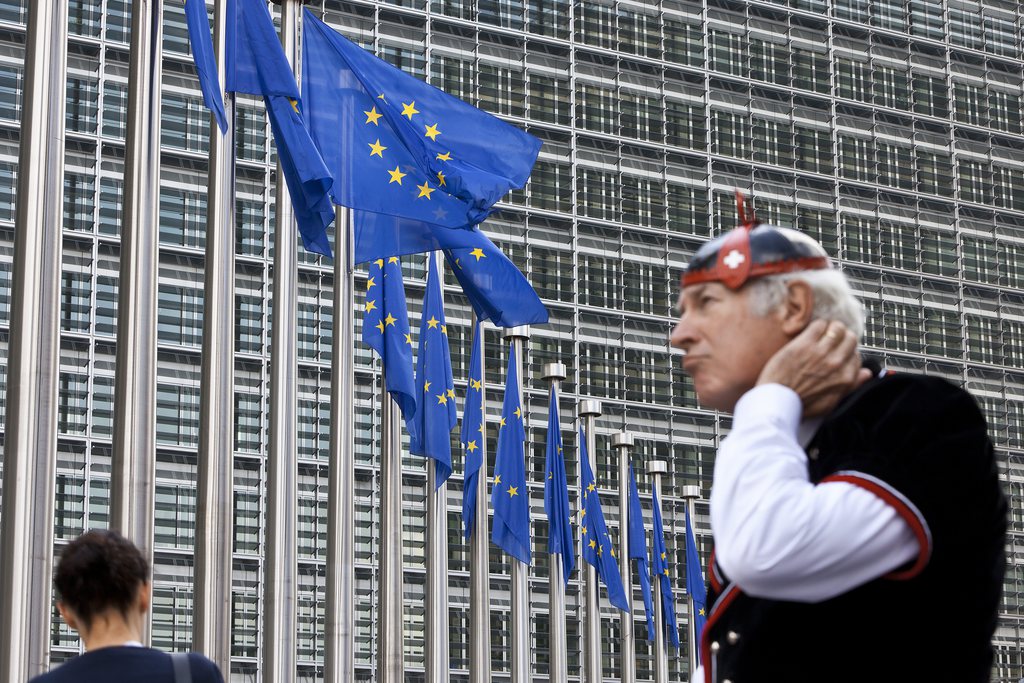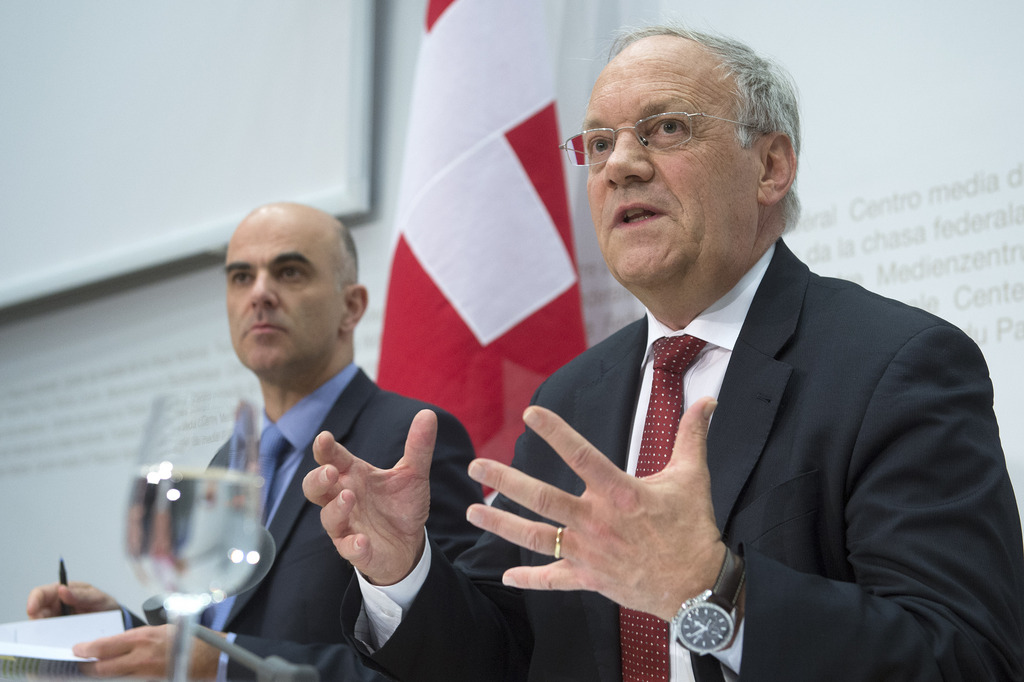EU snub leaves Swiss research community in limbo

Switzerland is no longer part of the “Champions League” of European research. Scientists tell swissinfo.ch their future is uncertain following the European Union’s decision to exclude Swiss institutes from funding within its flagship research programme.
Marc Donath was about to send off his application for the funding of a large diabetes study he wanted to coordinate between 22 centres in Europe and the United States, when he learned that the future of his €5.9 million (CHF7.2 million) project was uncertain.
“I have applied but I’m not sure if my collaborative research project will be approved,” said the head physician of Basel’s University Hospital.
“This is really the type of work we cannot do without international collaboration because in a country the size of Switzerland we can never enrol enough patients for such a large trial. And there is no other single institution to finance such a large project.”
Switzerland cites its participation in the competitive EU framework programmes as one of the driving forces behind its achievements in research and innovation. Researchers at Swiss institutions have been very successful in securing EU funding for their scientific projects, garnering an estimated €1.7 billion (CHF2.1 billion) between 2007 and 2013. (See infobox)
Anti-immigration initiative
But all this was thrown into turmoil when as a consequence of an anti-immigration initiative – approved by voters in February – the European Council excluded Switzerland as an associate member, suspending cooperation between researchers from Swiss institutions and their European partners and putting a hold on funding within Europe’s Horizon 2020 research programme.
Supported by the State Secretariat for Education, Research and Innovation, the Swiss National Science Foundation (SNSF) swiftly set up a transitional measure, offering researchers a temporary substitute for the prestigious European Research Council (ERC) starting and consolidator grants.
“The highly competitive and international nature of research in Switzerland must be safeguarded by specific measures until a new political agreement with the EU is reached,” the SNSF said. Because of this quick response many disconcerted scientists are able to carry on – for now.
Competitive edge
The head of SNSF’s Research Council, Martin Vetterli, warned these measures only addressed the immediate situation and in the “medium and long-term it is impossible to replace international competitiveness”.
Horizon 2020 is the biggest European research and innovation programme ever, with almost €80 billion of funding available between 2014 and 2020. The goal of the EU Framework Programme for Research and Innovation is to ensure Europe’s competitiveness, to remove barriers to innovation and to make it easier for the public and private sectors to work together in delivering innovation.
According to Laure Ognois, head of research at the University of Geneva, about 3,900 researchers from Switzerland participated in the previous European framework programme, FP7, between 2007 and 2013. They received €1.7 billion, 70% of which went to research institutions and 30% to industry and small and medium-sized companies.
According to an estimate by the Swiss branch of Ernst & Young, small biotech companies are hardest hit. Ernst & Young expert Jürg Zürcher told the Tages-Anzeiger newspaper that up to 50% of their research funds come from the European programme.
Many grant applicants are still feeling at a loss. They had their timelines protracted because of lower funding, making them lose their competitive edge and – in worst cases – they had to scrap their projects entirely. But the main blow is that European partners once again consider Switzerland a “third country” – along with non-European states like Japan or the United States – making it much harder to collaborate.
“The SNSF may have provided a back-up solution for funding, but we are no longer part of the competition,” said Olivier Küttel, head of European public affairs at the Federal Institute of Technology in Lausanne (EPFL).
“We are out of the Champions League,” he said, drawing an analogy between Swiss researchers and English football teams, which were banned from European competition following the Heysel Stadium disaster in 1985.
Brain drain
In a statement on Friday, Research Minister Johann Schneider-Ammann said Switzerland’s “complete affiliation with Horizon 2020 remains a priority for the government”.
“If politicians don’t find a solution soon, Swiss research partners will increasingly be seen as a risk and there will be a brain drain at Swiss universities,” warned Laure Ognois, head of research at the University of Geneva. She said the reputation and image of Swiss research as well as the confidence of researchers in the Swiss system would be “severely impacted”.
“Since the news, four out of 12 young researchers who were going to apply for ERC grants – they incarnate the excellence of today and tomorrow – have already left the University of Geneva,” she said.
Still, in response to the government’s back-up programme the SNSF received 145 applications for its CHF1.5 million starting grants worth a total of CHF219 million, in line with the 131 grant applications the ERC received from Switzerland in 2013, the foundation said.
Unfortunately, securing an ERC grant is not just about money (they are worth up to about €2.5 million each). They are also a distinction, a trophy or a label. For young researchers especially, securing an ERC grant is important for their careers, Küttel explains.
Swiss institutions may still participate in Horizon 2020, but they won’t be eligible for the main types of funding and they will also be excluded from strategic scientific committees and expert groups, so that they are no longer able to have a say on the future of European scientific programmes.
Researchers from Swiss institutes may no longer apply for European Research Council starting, consolidator and advanced grants. The Swiss National Science Foundation (SNSF) is providing a temporary replacement for some grants. Of those applications already filed, 88% are from researchers current working with a research institution in Switzerland. Of these, 36% were Swiss citizens, which the foundation said “reflects the very international nature of our research centres”.
ERC grants are the second-largest source of funding for researchers in Switzerland behind SNSF grants. Between 2007-2013, they totalled CHF500 million. The EU grants are mobile, meaning that researchers may move to another European research institute and take their grants with them.
Since the EU decision researchers from Swiss institutions are increasingly seen as a risk factor by their European partners as long as the funding of collaborative projects is not guaranteed by Switzerland. That is why four professors from the University of Geneva have for example already been excluded from European consortia, the university said.
Shock and frustration
Dennis Gillingham, a chemistry professor at the University of Basel who conducts research on how genetic information is regulated, had bet on the grant to open doors. His initial reaction at the news was shock and frustration as he is one of the researchers who just missed the opportunity to apply for an ERC starting grant within seven years of receiving a PhD.
“The prestige associated with these grants has made them an important milestone in obtaining permanent positions at European universities,” the Canadian national explained. He may still apply for other EU grants over the coming years but other applicants will have an edge.
“This was my last chance to apply for an early career ERC grant,” Gillingham said. “For the starter grant, I was a big fish in a small pool. From now on I will be a small fish in a large pool with much fiercer competition.”
Gillingham, like many who have come from abroad, is starting to doubt whether Switzerland will remain the paradise for cutting-edge research it is today thanks to government support, mechanisms to commercialise new discoveries and the proximity to the drug industry. “If the rug can get pulled out from under you at any time, then the best talents will go elsewhere.”
He is seconded by Christian Sengstag, research head at the University of Basel. “Switzerland will become less attractive for researchers from abroad,” he warned. “Top candidates will think twice before accepting a position in Switzerland and foregoing an important source of third-party funding.”
Human Brain Project
Still, only applications to be filed in the spring 2014 are affected and not projects already benefitting from EU funding. That is why the financing of the flagship Human Brain Project is secured through 2016. But what about its future?
“We are concerned,” said project leader Henry Markram recently. “Horizon 2020 is a key part of the funding of the Human Brain Project. We are right now in the process of writing up the more elaborate plans for Horizon 2020. In the midst of doing this there is the uncertainty whether the funding will continue.”
It wouldn’t be an option to take the project outside Switzerland, he notes. “Switzerland is absolutely key to making the Human Brain Project happen.” Its part includes amassing resources, simulation and piecing knowledge together. It would not feasible to continue without Switzerland, he says.
If the Horizon 2020 problems are not solved by next year, the exclusion will have “serious implications for the whole research landscape in Switzerland”, Küttel said. “To be successful you don’t just need money, you need to cooperate with the best.”

In compliance with the JTI standards
More: SWI swissinfo.ch certified by the Journalism Trust Initiative




You can find an overview of ongoing debates with our journalists here. Please join us!
If you want to start a conversation about a topic raised in this article or want to report factual errors, email us at english@swissinfo.ch.